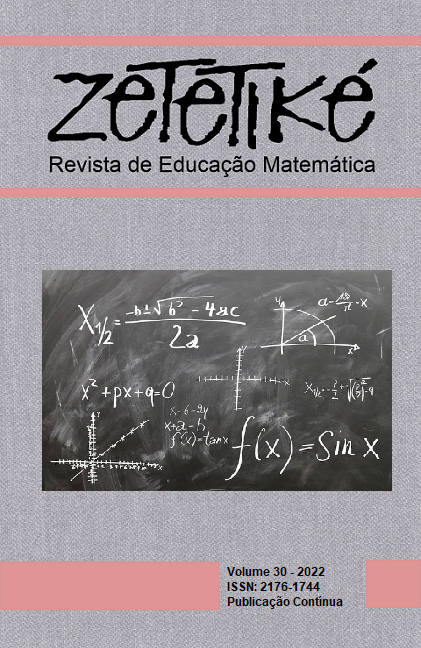Abstract
This paper contributes to the literature by presenting new developments about knowledge to teach and practices of primary teachers who participated in a teachers’ professional development programme focused on STEM (Science, Technology, Engineering and Mathematics) hands-on practices. This training context brings added challenges for teachers to innovate their practices in class, namely mathematical practices related to STEM. In particular, we research what knowledge promotes the development and implementation of mathematical interdisciplinary practices within the referred context. With a qualitative methodology and an interpretative approach, and based on data collected for three school years, we conclude that there exists specialized knowledge that is crucial for teachers to be able to develop and implement mathematical interdisciplinary practices in class, which must be taken into account, with a view to the effectiveness of teachers professional development programmes.
References
Abrahams, I., Reiss, M. J., & Sharpe, R. (2014). The impact of the getting practical: Improving practical work in science continuing professional development programme on teachers' ideas and practice in science practical work. Research in Science & Technological Education, 32(3), 263-280.
Baker, C K, Galanti, T M. (2017). Integrating STEM in elementary classrooms using model-eliciting activities: responsive professional development for mathematics coaches and teachers. International Journal of STEM Education. 4(1), 1-15.
Becker, K., & Park, K. (2011). Effects of integrative approaches among science, technology, engineering, and mathematics (STEM) subjects on students’ learning: A preliminary meta-analysis. Journal of STEM Education, 12(5 & 6), 23-37.
Beswick, K. & Fraser, S. (2019). Developing mathematics teachers’ 21st century competence for teaching in STEM contexts. ZDM Mathematics Education, 51, 955–965.
Ball, D. L., Thames, M. H., & Phelps, G. (2008). Content knowledge for teaching what makes it special? Journal of teacher education, 59(5), 389-407.
Cohen, L., Lawrence, M., & Keith, M. (2007). Research Methods in Education. 6th Edition. Taylor and Francis Group.
Costa, M. C., & Domingos, A. (2017). Innovating teachers’ practices: potentiate the teaching of mathematics through experimental activities. In T. Dooley & G. Gueudet (Eds.), Proceedings of the Tenth Congress of the European Society for Research in Mathematics Education (CERME 10, February 1-5, 2017, pp. 2828-2835). Dublin, Ireland: DCU Institute of Education and ERME.
Costa, M. C., & Domingos, A. (2018). Qual o conhecimento para implementar o ensino experimental das ciências? [What knowledge is necessary to implement hands-on science experiments]. Revista de Educação, Ciências e Matemática [Journal of Education, Science and Mathematics], 8(1), 51-72.
Costa, M. C., & Domingos, A. (2019). Promoting mathematics teaching in the framework of STEM integration. In CERME 11 (Eleven Congress of the European Society for Research in Mathematics Education, February 6-10). Utrechet, Netherlands. Proceedings of the Eleventh Congress of the European Society for Research in Mathematics Education, 4749- 4756.
Costa, M. C., Domingos, A., & Teodoro, V. (2020). Promoting integrated STEM tasks in the framework of teachers’ professional development in Portugal. In J. Anderson & Y. Li (Eds.), Integrated Approaches to STEM Education. Advances in STEM Education. (pp. 511-532). Springer, Cham. ISBN: 978-3-030-52229-2, DOI: https://doi.org/10.1007/978-3-030-52229-2_27
Desimone, L. M. (2009). Improving impact studies of teachers’ professional development: Toward better conceptualizations and measures. Educational Researcher, 38(3), 181-199.
English, L. D. (2017). Advancing Elementary and Middle School STEM Education. International Journal of Science and Mathematics Education, 15(1), 5-24.
European Schoolnet (2018). Science, Technology, Engineering and Mathematics Education Policies in Europe. Scientix Observatory report. October 2018, European Schoolnet, Brussels.
Fitzallen, N. (2015). STEM Education: What does mathematics have to offer? In M. Marshman (Eds.), Mathematics Education in the Margins. Proceedings of the 38th annual conference of the Mathematics Education Research Group of Australasia, Sunshine Coast, pp. 237-244.
Kim, D., & Bolger, M. (2017). Analysis of Korean elementary pre-service teachers’ changing attitudes about integrated STEAM pedagogy through developing lesson plans. International Journal of Science and Mathematics Education, 15(4), 587-605.
Magnusson, S., Krajcik, J., Borko, H. (1999). Nature, sources, and development of pedagogical content knowledge for science teaching. In J. Cess-Newsome & N. G. Lederman (Eds.), Examining pedagogical content knowledge (pp. 95-132). Springer, Dordrecht, Boston, London: Kluwer Academic Publishers.
Park, S., & Oliver, J. S. (2008). Revisiting the conceptualisation of pedagogical content knowledge (PCK): PCK as a conceptual tool to understand teachers as professionals. Research in science Education, 38(3), 261-284.
Shaughnessy, J. M. (2013). Mathematics in a STEM context. Mathematics Teaching in the Middle School, 18(6), 324-324.
Shulman, L. S. (1986). Those who understand: Knowledge growth in teaching. Educational researcher, 15(2), 4-14.
Stohlmann, M. (2018). A vision for future work to focus on the “M” in integrated STEM. School Science and Mathematics, 118(7), 310-319. DOI: https://doi.org/10.1111/ssm.12301.

This work is licensed under a Creative Commons Attribution-NonCommercial-NoDerivatives 4.0 International License.
Copyright (c) 2022 Zetetiké


